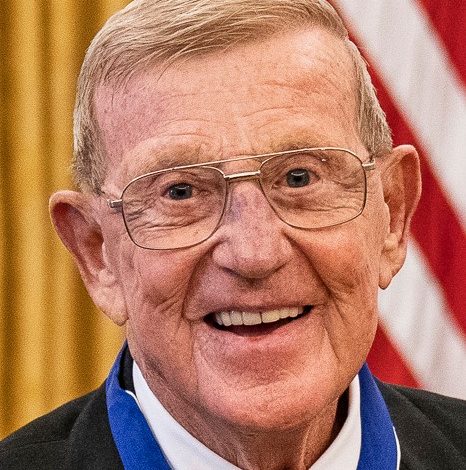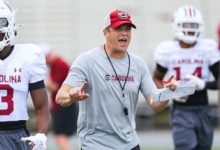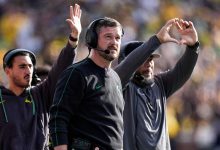1988 Notre Dame Football: Lou Holtz’s Leadership Defines One of the Most Iconic Seasons in College Football History.

The 1988 Notre Dame Fighting Irish football season remains one of the most legendary and iconic in the annals of college football history. Under the guidance of head coach Lou Holtz, the Irish not only delivered a National Championship but also cemented their place as one of the most feared and respected teams of the era. The season was filled with monumental moments, unforgettable victories, and a level of dominance that has yet to be matched in many respects.
Notre Dame’s journey through the 1988 season was defined by Holtz’s exceptional leadership, a key reason why the Fighting Irish finished the season as the #1 team in the nation. The season’s triumphs weren’t merely a reflection of talent on the field but were also shaped by Holtz’s discipline, strategic genius, and ability to unite a team with a singular purpose. This article will delve into the legacy of the 1988 season, exploring how Lou Holtz’s leadership shaped a historic campaign and how his coaching methods transformed Notre Dame into a dominant force in college football.
The Arrival of Lou Holtz and the Foundation for Success
When Lou Holtz took over as Notre Dame’s head coach in 1986, the program was in need of a turnaround. The Irish had gone through a difficult period in the early 1980s, marked by inconsistent performances, underachievement, and a lack of direction. Holtz’s mission was clear: restore Notre Dame’s reputation as a powerhouse, reestablish its winning culture, and bring the program back to national prominence.
Holtz’s leadership was immediately apparent. Known for his motivational skills, keen football intellect, and ability to develop players, he quickly turned Notre Dame into a team with discipline and purpose. By the time the 1988 season arrived, Holtz had instilled a sense of pride and belief in the program. The foundation had been laid for what would become one of the most successful seasons in the history of college football.
A High-Caliber Roster of Talent
The 1988 season was about more than just Holtz’s coaching. The Irish roster that year was stacked with elite talent on both sides of the ball, making them one of the most complete teams in college football.
On offense, quarterback Tony Rice was the engine that drove the Irish offense. Rice, a dynamic dual-threat quarterback, had the ability to make plays with his arm and legs. His leadership and poise in big moments were instrumental to Notre Dame’s success. Rice’s running ability, in particular, was crucial to the offense’s success, as his mobility added a dimension to the Irish attack that few teams could defend. He finished the season with over 1,200 yards passing and nearly 1,000 yards rushing, an indication of his multifaceted skill set.
The Irish backfield, led by Reggie Brooks, was a dangerous force. Brooks, a standout running back, rushed for over 1,200 yards and 13 touchdowns during the season, earning All-American honors. His ability to break tackles and find the end zone made him a key part of the Irish offensive game plan.
Wide receiver Raghib “Rocket” Ismail was one of the most explosive playmakers in college football in 1988. Known for his speed and big-play ability, Ismail caught 43 passes for over 1,000 yards and 8 touchdowns. His threat on the field extended beyond just receiving, as he was also a key returner on special teams, adding another dimension to the Notre Dame offense.
On defense, the Irish were equally formidable. Led by future NFL stars like Pat Terrell, Tommy Rees, and Chris Zorich, the Notre Dame defense was tough, disciplined, and relentless. The defense was known for its ability to stop the run, pressure the quarterback, and create turnovers. Zorich, in particular, was a force in the middle of the defensive line, earning All-American honors for his disruptive play. The defense helped keep games close and allowed the offense to take control when needed.
The Defining Games of 1988
The 1988 season was not without its challenges. To earn the National Championship, the Irish had to navigate a brutal schedule that featured several high-profile opponents. However, it was the team’s ability to rise to the occasion in critical moments, led by Holtz, that set the 1988 season apart.
One of the most significant victories of the season came on October 15, 1988, when Notre Dame faced Miami in a game that would go down as one of the most memorable in college football history. Miami, led by legendary coach Jimmy Johnson, had been the reigning national champion and had won 36 consecutive games. The Hurricanes were widely considered the team to beat, and they had a powerhouse roster. But Notre Dame, in front of a raucous home crowd at Notre Dame Stadium, played one of the best games of the season.
The game was a hard-fought battle, but Notre Dame’s defense stepped up when it mattered most, and the offense made timely plays to secure a 31-30 victory. Tony Rice led a dramatic fourth-quarter drive to seal the win, and the Irish’s victory over Miami was a statement of their national title aspirations. The win would later be remembered as one of the pivotal moments of the season and helped propel Notre Dame to the top of the rankings.
Another key moment came in the Sugar Bowl, where Notre Dame squared off against West Virginia for the National Championship. The game itself was a test of character for the Irish, as West Virginia came into the contest as a highly motivated team, seeking to claim its first-ever national title. The Irish, however, remained unfazed by the pressure and ultimately dominated the Mountaineers 34-21. In what was his final game as Notre Dame’s head coach, Lou Holtz guided the Irish to victory, securing the National Championship and confirming the success of the 1988 season.
Holtz’s Leadership: A Legacy of Motivation and Discipline
Lou Holtz’s leadership throughout the 1988 season was a defining factor in the team’s success. Known for his ability to motivate players and create a culture of accountability, Holtz’s coaching philosophy focused on discipline, preparation, and team unity. He often spoke about the importance of playing with heart and staying focused on the task at hand, even in the most difficult of circumstances.
Holtz was a master at using motivation to inspire his players, especially when the stakes were highest. His speeches were legendary, and his ability to get his players to believe in themselves and their team was one of the key reasons why Notre Dame was able to perform at such a high level throughout the season. His calm demeanor in the face of pressure and his knack for making the right calls at the right times played a major role in the Irish’s success.
The Impact of the 1988 Season on Notre Dame Football
The 1988 National Championship was the culmination of everything Lou Holtz had worked for since taking over the program in 1986. Under Holtz, Notre Dame was transformed from a team with potential into a national title contender. His leadership not only brought Notre Dame back to the top but also set the foundation for continued success in the years that followed.
The 1988 season was also a turning point for college football. Holtz’s success at Notre Dame demonstrated that a well-coached, disciplined, and fundamentally sound team could rise above the competition and claim the ultimate prize. The season served as a model for other programs, showing that a combination of talent, coaching, and leadership could lead to greatness.
Furthermore, the 1988 title reignited Notre Dame’s passionate fan base, which had been waiting for a return to glory. The success of the team helped solidify the university’s place as one of college football’s most respected programs, and the Irish remained a national contender throughout the 1990s and beyond.
Holtz’s Legacy at Notre Dame
Lou Holtz’s impact on Notre Dame football extended far beyond the 1988 season. His tenure as head coach marked an era of success for the program, and his leadership was instrumental in returning Notre Dame to national prominence. Holtz finished his career at Notre Dame with a record of 100-30-2 and remains one of the most revered coaches in the program’s history.
Beyond the victories and championships, Holtz’s greatest legacy at Notre Dame lies in the culture of excellence he instilled in the program. The lessons of discipline, preparation, and mental toughness that he imparted to his players have left a lasting imprint on the Notre Dame football program and continue to influence the team to this day.
The 1988 season remains a defining moment in the rich history of Notre Dame Football, and it is forever intertwined with the remarkable leadership of Lou Holtz. His coaching, motivation, and unwavering belief in his players turned the Fighting Irish into a championship-caliber team and led them to the pinnacle of college football. For the players, coaches, and fans, the 1988 National Championship represents not just a victory, but a legacy of excellence that continues to define the Notre Dame program today.
As the Irish celebrated their victory, the lessons of that unforgettable season lived on. Holtz’s leadership laid the groundwork for the future of Notre Dame football, and the 1988 championship remains a beacon of what can be achieved through hard work, discipline, and the power of great coaching. It is a season that will always be remembered as one of the most iconic in the history of college football.









